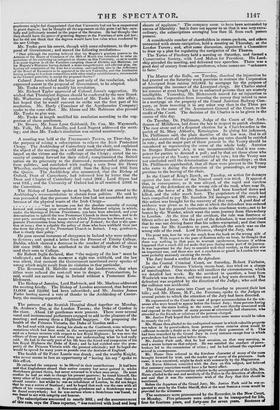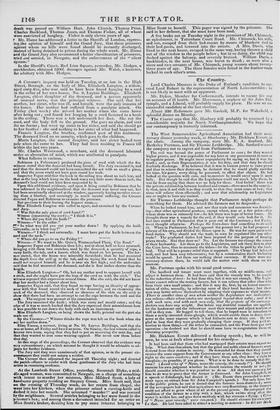The Master of the Rolls, on Tuesday, dissolved the injunction
he had granted on the Saturday week previous to restrain the Corporation of Liverpool from raising 105,000/. by mortgage for the purpose of augmenting the incomes of the Liverpool clergy. Sir Charles stated his reasons at great length ; but to unlearned persons they are seareely intelligible. Yesterday, Mr. Bickersteth moved for an injunction to restrain the Corporation from investing the money they intend to raise in a mortgage on the property of the Grand Junction Railway Com- pany, or from investing it in any other way than in the Three per Cents., in the name of the Accountant- General of the Court, to the credit of the Court. The decision of Sir Charles is to be given in the course of this day. On Tuesday, Dr. Phillimore, Judge of the Court of the Arch- deacon of Middlesex, laid down the law in respect to parish elections. The case arose out of a disputed election for a Churchwarden in the parish of St. Mary Abbott's, Kensington. In giving his judgment, Dr. Phillimore said, the plain doctrine of the law was, that in all parochial contests all the parishioners who pay rates should be entitled to vote ; and the major part of those present in the Vestry should be considered as representing the sense of the whole body. Anterior to Sturges Bourne's Act, it was incontrovertible that it was com- petent for parties to demand a poll ; and by that act those alone who were present at the Vestry were entitled to vote ; but the Vestry was not concluded until the determination of all the proceedings ; so that Dr. Phillimore apprehended, that all those were present in the Vestry who came in during the discussion of the proceedings, or any time previous to the leaving of the chair. In the Court of King's Bench, on Tuesday, an action for damages against the late driver of the Nimrod coach was tried. It appear:it that, in consequence, as it was alleged, of the rapid and careless driving of the defendant on the wrong side of the road, when near St. Albans, the horse of a Mr. Saunders had been knocked down and killed, and the rider much hurt. The proprietors of the coach had been compelled to pay Mr. Saunders 70/. damages and 281. costs; and this action was brought for the recovery of that sum. A good deal of evidence was given as to the rate at which the defendant was ordered to drive; but the general instructions to the coachman were—not to be beaten by the Wonder, which went the same journey from Shrewsbury to London. At the time of the accident, the rate was fourteen or fifteen miles an hour. On the part of the defendant, it was maintained that he was not driving faster than his orders warranted; and that there was room for Mr. Saunders to pass, although the coach was on the wrong side of the road. Lord Denman, charged the Jury, that The point was, how far was the coach from the bank on the wrong side of the road. With respect to the pace of fourteen miles an hour, he thought that there was nothing in that pace to warrant carelessness, because it seldom happened that a coach did not make that pace during some part of its journey. It was important for the Jury to consider well their verdict, as the point was an important one, and there was not a coachman or guard in London but was most probably anxiously awaiting the result. The Jury found a verdict for the defendant. In the Central Criminal Court, on Saturday, Robert Fairhairn, Captain of the Princess Victoria steam-boat, was tried on a charge of manslaughter. Our readers will recollect the circumstances, which we detailed last week. By the accident in question, a boat from Woolwich was run down, and two men and a boy were drowned. The defendant was acquitted by the direction of the Judge; who said that the collision was accidental.
The Grand Jury came into Court on Saturday to present their last bills ; and Mr. Hume, M. P., the Foreman, spoke to the Judges oat several points to which the attention of the Jury had been directed.
He represented to the Court the want of proper accommodation for the wit- nesses who were bound to appear before the Grand Jury ; these persons having to stand on the stairs leading to the room, and were thereby associated with and exposed to the insults of many persons of notoriously bad character, wits attended as the friends or relations of the persons charged. Mr. Justice Park hoped that before next Session some means would be takea to remedy the evil. Mr. Hume then alluded to the undisguised manner in which valuable property was taken in by pawnbrokers, from persons whose exterior alone would be sufficient to excite a doubt as to the propriety of their possession of it. This had been remarked by the Grand Jury in every instance except four in which pawnbrokers had been called before them. Mr. Justice Park said, that he had occasion, on that very morning, le read a severe lecture on that subject. He VMS satisfied the conduct of pawn- brokers led to the commission of crime ; and lie had refused the expenses of several in consequence.
Mr. Hume then referred to the fl ivolous character of many of the cases brought forward for trial, and the tender age of many of the prisoners. Suck cases, it was conceived, might be dealt with summarily by the Magistrates. Mr. Baron Alderson coincided with the Jury on this subject, acid believed that summary conviction would have a far better effect.
After some further conversation relative to the arrangements of the bills, Mr. Hume alluded to the zeal and assiduity of the Police in the detection of offenders, and said that it was the unanimous wish of the Jury that this should be mentioned. Before the departure of the Grand Jury, Mr. Justice Park said he was re- quested to state by the Under Sheriff, that at the next Session a room would be provided for the witnesses. The sentences were pronounced by the Recorder, in the New Court, on Monday. Five prisoners were ordered to be transported for life, four for fourteen years, and forty-one for seven years. Sentence of death was passed on William Hart, John Church, Thomas Prior, Charles Buckland, Thomas Jones, and Thomas Fisher, all of whom were convicted of burglary. Fisher is only eleven years of age.
P Mr. Hume has addressed a letter to the Sheriffs of London, express- ing the opinion of himself and the Grand Jury, that those prisoners against whom no bills were found should be instantly discharged, instead of being detained in prison during the whole week. Mr. Hume and the Grand Jury also recommend a better classification of prisoners, tried and untried, in Newgate, and the enforcement of the " silent system."
In the Sheriff's Court, Red Lion Square, yesterday, Mr. Hodges, a stockbroker, obtained 1200/. damages against Mr. Walsh, a barrister, for adultery with Mrs. Hodges.



























 Previous page
Previous page